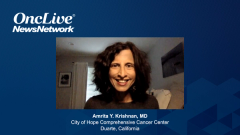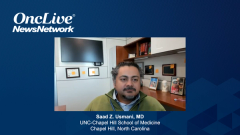
Adding Venetoclax to Daratumumab and Dexamethasone in RRMM
In relapsed/refractory multiple myeloma, a recent study tested the addition of venetoclax to daratumumab and dexamethasone.
Episodes in this series

Transcript:
Saad Z. Usmani, MD: The combination of daratumumab with venetoclax and dexamethasone has been evaluated and reported on previously, primarily focusing on translocation (11;14) relapsed/refractory multiple myeloma. The initial dose-escalation study has previously been presented showing that this combination is very active for patients with translocation (11;14). At ASH [American Society of Hematology annual meeting] this year [2021], my colleague Jonathan Kaufman, [MD,] from Emory University had reported on the third part, which was a randomized phase 2 study part comparing venetoclax, daratumumab, dexamethasone to daratumumab, bortezomib, dexamethasone in patients with translocation (11;14). What he showed was a clear benefit in favor of the venetoclax, daratumumab, dexamethasone combination.
Now, this is a small randomized phase 2 study with a highly selected translocation (11;14) population. The safety profile looked tolerable. The responses were very high in favor of the venetoclax, daratumumab, dexamethasone combination. At the dose of 400 mg, I think the response rates were somewhere in the mid-70% range, whereas with the 800 mg dose of venetoclax, the responses were almost 100%. I’m excited about these data. I think we just need to see long-term follow-up to see if these responses are translating into PFS [progression-free survival] benefit for this patient population.
Transcript edited for clarity.






































